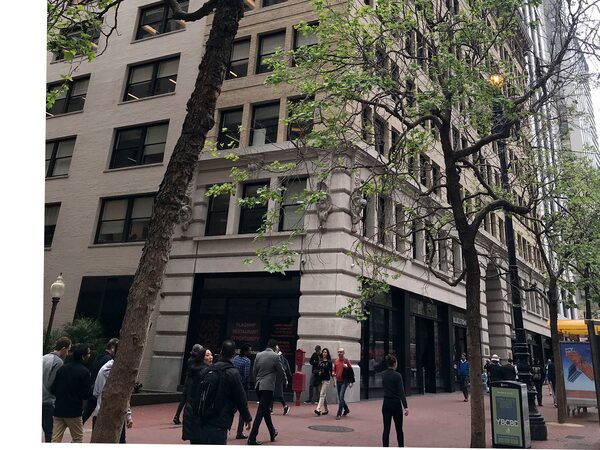
The Monadnock Building is owned by Brookfield Office Properties, whose parent company, Brookfield Asset Management Inc. is headquartered in Toronto.DAVID ISRAELSON/The Globe and Mail
Brookfield Asset Management Inc. is putting US$1-billion behind its belief that investors are undervaluing its real estate partnership in the punishing era of COVID-19.
Brookfield announced Thursday it will advance the money to its Brookfield Property Partners LP, known by its ticker symbol BPY, so BPY can buy back nearly 75 million of its units at US$12 each. That’s a premium of more than 17 per cent to BPY’s closing price on the Nasdaq on July 1.
Brookfield Property REIT Inc., a U.S. subsidiary of BPY, will do a simultaneous offer for more than nine million of its own shares.
BPY, which owns hundreds of shopping malls and office buildings around the world, saw its unit price plunge more than half in March as the COVID pandemic took hold. The values of rival publicly traded retail and commercial landlords also plummeted as investors worried about the prospects for traditional stores and offices in the post-virus economy.
Half of the US$1-billion for BPY is coming directly from Brookfield, and the other half from the outside investors in its partnerships. BPY will essentially pay back Brookfield and the investors by turning the BPY units and REIT shares over to them.
If BPY can complete the buyback, which will be done as a tender offer running through late August, it will boost Brookfield’s ownership of BPY from 55 per cent to 63 per cent.
The buyback offer “will provide unitholders who desire liquidity an opportunity to sell their stock at a premium to the market price, while preserving BPY’s liquidity,” BPY CEO Brian Kingston said in a statement.
While dozens of Toronto Stock Exchange-listed companies have announced share buybacks since the COVID crisis hit, most are in the tens of millions of dollars, with some topping $300-million — far below the scope of the BPY offering.
Brookfield has already bought back its own shares and those of its publicly listed partnerships, which also include vehicles for infrastructure, energy and other business investments. Brookfield spent US$300-million on those buybacks between late February and its May 14 first-quarter earnings announcement, it said.
On May 21, it renewed a program that would allow it to buy up to nearly 133 million shares worth nearly US$4-billion. Its purchases in a similar program over the previous year amounted to US$425-million.
BPY owns 136 office buildings totalling 93 million square feet and 122 malls and urban retail properties, totalling 120 million square feet, including what it says are 100 of the top 500 malls in the United States.
Even before COVID, however, legacy retailers were challenged. The virus also called into question the long-term value of office buildings. A recent report by S&P Global Market Intelligence looked at seven leading publicly traded real estate investment trusts and partnerships, primarily based in the U.S. All saw precipitous drops in their share price in the first quarter. BPY’s 55-per-cent decline ranked fifth of the seven. Its shares hit a 52-week low of US$7.10 on April 3.
Brookfield has argued that BPY is worth much more than the markets have said. When Brookfield reported its first-quarter results, it said the stock market value of its BPY stake on March 31 was US$4.27-billion. But it recommended investors focus on the US$15.3-billion value it places on the stake under International Financial Reporting Standards. “We … believe we could liquidate for IFRS values,” Brookfield told investors.
When Brookfield released those results on May 14, Mr. Kingston joined the company’s investor call to say a new generation of digital-savvy retailers want to increase their physical presence. “There was a waiting line of new tenants to take the place of old-line retailers when they vacate our malls,” he said.
In interviews in recent weeks, Brookfield CEO Bruce Flatt has said demand is increasing, not declining. “We’ve had more tenants ask us for more space since this occurred than for less to accommodate more distancing,” he told Reuters in early June.
But Brookfield also launched a US$5-billion “Retail Revitalization Program” to prop up retailers hit by the pandemic. And Brookfield hopes to find investment opportunities in the retail carnage while mitigating the damage to its malls.
While BPY’s shares were up more than 40 per cent from the trough to their close prior to Thursday’s announcement, they remained at less than half their 52-week high, reflecting continued investor pessimism about real estate.
Moody’s Investors Service downgraded the credit ratings of Brookfield Property REIT Inc. on Wednesday, saying “many of the REIT’s largest tenants are facing financial distress or are opportunistically rationalizing their store footprints ... Moody’s expects the COVID-19 pandemic to accelerate more store closures in the next 24 months than would otherwise happen over a multiyear horizon.”
Your time is valuable. Have the Top Business Headlines newsletter conveniently delivered to your inbox in the morning or evening. Sign up today.
 David Milstead
David Milstead